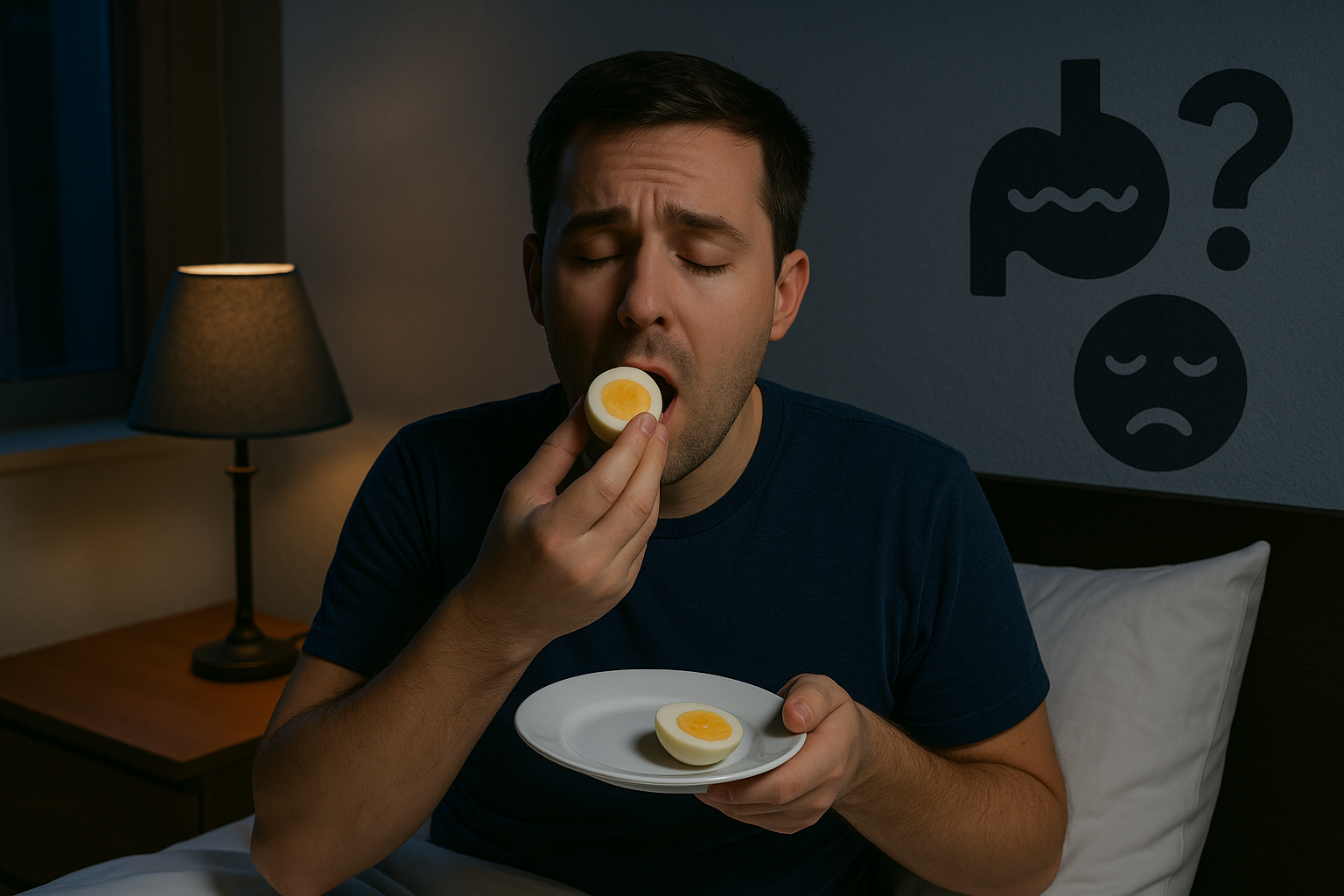Eggs are a nutritious and versatile food, enjoyed by people all over the world at breakfast, lunch, and dinner. But when it comes to eating eggs at night, many wonder: is it safe? Could it cause discomfort, disrupt sleep, or lead to weight gain? Here’s what the science says.

1. Nutritional Benefits of Eggs
Eggs are a rich source of high-quality protein, healthy fats, vitamins (A, D, E, B12), and minerals such as selenium and choline. Just one large egg contains about 6 grams of protein and essential amino acids that support muscle repair, hormone production, and brain function.
2. Can You Eat Eggs at Night?
Yes, you can eat eggs at night—but with some considerations. For most healthy individuals, having eggs as part of a light dinner or evening snack is perfectly fine. In fact, the protein in eggs can help you feel fuller longer, which may prevent late-night cravings or overeating.

However, some people may experience the following:
a. Digestive Discomfort
Eggs, especially when fried or cooked in heavy oils and butter, can be harder to digest at night. This may lead to:
-
Bloating
-
Indigestion
-
Acid reflux
People with a history of gastroesophageal reflux disease (GERD) may want to avoid greasy or spicy egg dishes before bed.
b. Sleep Disruption
While eggs contain nutrients that support sleep—like tryptophan and melatonin-boosting B vitamins—eating a heavy, protein-rich meal too close to bedtime can raise body temperature or metabolic activity, making it harder to fall asleep.
Tip: If you eat eggs at night, do so at least 1–2 hours before bed and avoid pairing them with caffeine, spicy sauces, or large portions.
c. Weight Concerns
Late-night snacking in general is linked to weight gain in some studies, especially if it involves high-calorie or fatty foods. While eggs themselves are relatively low in calories (about 70 per egg), what you eat with them matters—cheese, bacon, buttered toast, and high-fat sauces can quickly add up.
If you’re trying to manage your weight, opt for:
-
Boiled eggs
-
Poached eggs
-
Egg white omelets with vegetables

3. Eggs Can Actually Be Beneficial at Night
Believe it or not, eggs at night may offer health benefits:
-
Muscle repair during sleep: Protein helps rebuild and maintain muscle, which is especially useful if you exercise in the evening.
-
Satiety: Eggs are filling and can reduce the urge to snack on processed or sugary foods before bed.
-
Brain function: Choline, found in eggs, supports memory and nervous system health.
4. Who Should Be Cautious?
You might want to avoid eggs at night if:
-
You suffer from frequent heartburn or acid reflux
-
You have trouble digesting fats or proteins
-
You experience disturbed sleep after heavy meals
Everyone’s digestive system is different. If you feel sluggish, bloated, or wake up in the middle of the night after eating eggs, it may be best to avoid them late in the day.

5. Best Ways to Eat Eggs at Night
If you choose to include eggs in your evening meal, here are some light and healthy options:
-
Boiled eggs with a salad
-
Scrambled eggs with steamed vegetables
-
Egg white omelet with spinach and mushrooms
-
Soft poached eggs with whole grain toast
Avoid deep-fried or creamy preparations like:
-
Eggs Benedict with hollandaise sauce
-
Fried eggs with butter and bacon
-
Cheese-loaded omelets
Conclusion
Eating eggs at night is generally safe for most people and can even support muscle recovery and satiety when prepared healthily. However, if you have digestive issues, sensitivity to protein, or sleep disturbances, you might want to monitor how your body responds. Choose light, boiled, or steamed egg dishes and avoid eating too close to bedtime.
As with any food, moderation and timing are key. Listen to your body, and if eggs make you feel good at night—enjoy them!


